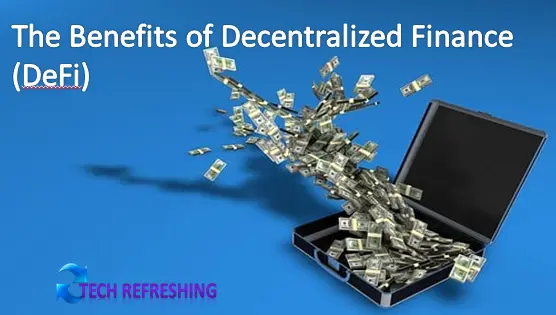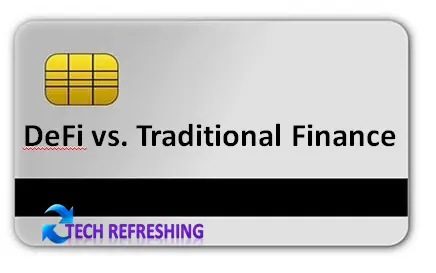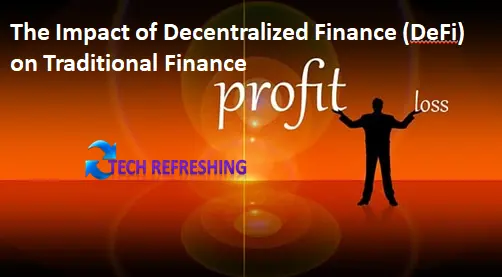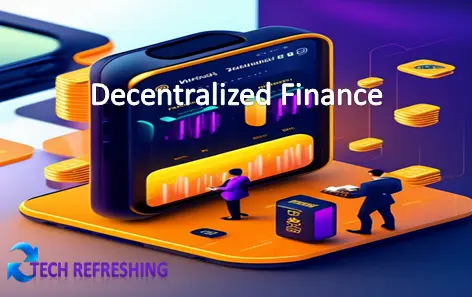Decentralized Finance, or DeFi, is a rapidly expanding financial system based on blockchain technology. It makes use of decentralised protocols, smart contracts and open-source software to provide a distinctive, secure, open and accessible method of handling money, potentially upsetting established financial systems.
DeFi runs on a decentralised network, which means it doesn’t rely on centralised intermediaries like banks, investment companies and government-backed enterprises. Peer-to-peer transactions are possible with DeFi protocols instead of using middlemen. With conventional finance, this does not offer the same level of security and transparency.
DeFi has a wide range of advantages, including bettering financial transaction security and transparency, expanding access to financial services for underbanked people and possibly generating higher returns on investments. DeFi enables users to avoid conventional financial middlemen, which can save time and money.
This blog post delves into the prospects of DeFi and its effect on conventional finance. It compares DeFi to traditional finance, highlighting its benefits and foresees its potential future impact on the finance industry. Ideal for both finance experts and beginners, it serves as a comprehensive guide to comprehending DeFi and its influence on traditional finance.
The Benefits of Decentralized Finance (DeFi)

Increased Accessibility
DeFi provides a more approachable substitute for conventional finance, especially for underbanked people. It is challenging for people to save, invest and obtain credit in many parts of the world because access to financial services is restricted or nonexistent. DeFi offers financial services using decentralised protocols, which do not require a physical location or a credit history, as a solution. As a result, everyone with access to the internet can use DeFi services, regardless of location or socioeconomic status.
Users can earn interest on their bitcoin holdings using DeFi protocols like Aave and Compound, regardless of their access to traditional banking services. For people who weren’t previously included in the financial system, this opens up new opportunities.
Higher Returns on Investment
DeFi protocols often offer higher returns on investment than traditional investments, such as savings accounts, bonds and stocks. This is due to the high yield opportunities that DeFi protocols offer, such as yield farming, staking and liquidity provision.
Yield farming allows users to earn high returns by lending or staking their cryptocurrency holdings. By supplying liquidity to DeFi protocols like Uniswap, users are able to earn interest. In comparison to conventional financial products, these high-yield options give individuals a method to increase the returns on their investments.
Improved Transparency and Security
Traditional financial institutions, such banks and investment businesses, frequently act as middlemen and are therefore vulnerable to fraud and unethical behaviour. DeFi protocols on the other hand are open-source and transparent as they are based on blockchain technology.
Protocols in DeFi, such as MakerDAO and dYdX, utilize smart contracts to automate financial dealings, eliminating intermediaries in the process. This leads to greater transparency and security compared to traditional finance. Built on decentralized networks, DeFi protocols offer increased resistance against hacking and fraud.
Bypassing Traditional Intermediaries
DeFi protocols enable direct peer-to-peer transactions without middlemen, leading to quicker operations and less expensive prices. This provides more control over financial activities, making it a desirable choice for people desiring greater independence.
Protocols in DeFi, like Kyber Network and Polkadot Network, enable users to exchange cryptocurrency without relying on centralized exchanges as intermediaries. This grants users increased control over their financial dealings and reduces the costs and time associated with traditional financial intermediaries.
Reduced Costs and Increased Efficiency
In comparison to traditional finance, DeFi protocols aim to be more cost-effective and efficient by eliminating intermediaries, such as banks, that charge for their services. The automation of various financial processes through DeFi protocols leads to decreased time and expenses in comparison to conventional financial services.
DeFi protocols such as Gnosis and dxDAO allow users to participate in decentralized governance, which can make decision-making more efficient and cost-effective.
Borderless Financial Services
Users can access DeFi protocols from any location in the world thanks to DeFi’s borderless financial services. This is a huge benefit for people looking for financial services that are not location-restricted. DeFi protocols are made to be accessible from anywhere in the world as long as there is an internet connection.
DeFi protocols such as Binance Smart Chain and Polygon allow users to access DeFi services from anywhere in the world, regardless of where they are located.
Increased Financial Inclusion
By giving those who were previously shut out of the financial system access to financial services, DeFi has the potential to improve financial inclusion. DeFi can reach underbanked groups that may have been shut out of traditional financial services owing to lack of access or a poor credit history by offering decentralised financial services.
DeFi protocols such as BlockFi and Nexo offer loans to users, based on their cryptocurrency holdings, without the need for a credit check. This provides financial services to those who may have been excluded from traditional financial services due to lack of credit history.
DeFi offers a wide range of advantages, including improved security and transparency, fewer costs and higher efficiency, borderless financial services, greater financial inclusion and increased accessibility. It also bypasses conventional intermediaries. It is obvious that DeFi is changing the way that finance operates and has the ability to offer financial services to a wider range of individuals as DeFi standards continue to develop and expand.
DeFi vs. Traditional Finance

Decentralized finance (DeFi), a new financial system based on blockchain technology, aims to deliver financial services without the use of middlemen. Traditional finance, on the other hand, relies on intermediaries like banks and investment firms to deliver financial services.
Control and Ownership
One of the key differences between DeFi and traditional finance is control and ownership. In traditional finance, users rely on intermediaries, such as banks and investment firms to control and manage their financial assets. In contrast, DeFi provides users with direct control and ownership over their financial assets, through decentralized protocols.
In traditional finance, a user would deposit their money into a bank account, which is controlled by the bank. In DeFi, a user would deposit their cryptocurrency into a DeFi protocol, such as Compound or Aave, which they have direct control and ownership over.
Transparency and Security
Security and transparency are two more significant differences between DeFi and conventional financing. Due to the possibility of intermediaries being governed by a small group of individuals, traditional finance is frequently the victim of fraud or unethical activity. Contrarily, blockchain technology, which offers a high level of security and transparency, is the foundation for the DeFi protocols.
Traditional investment firms may engage in insider trading or other unethical practices, which can negatively impact their clients. In DeFi, protocols such as MakerDAO and dYdX use smart contracts to automate financial transactions, which eliminates the need for intermediaries and provides a level of transparency and security that is not possible with traditional finance.
Costs and Efficiency
Traditional finance can often be expensive and time-consuming due to the need for intermediaries and manual processes. In contrast, DeFi protocols are designed to be more cost-effective and efficient by eliminating the need for intermediaries and automating many financial processes.
Traditional banks may charge fees for their services such as overdraft fees or monthly maintenance fees. In DeFi, protocols such as Gnosis and dxDAO allow users to participate in decentralized governance, which can make decision-making more efficient and cost-effective.
DeFi provides a new type of financial system that is built on blockchain technology and is designed to provide financial services without the need for intermediaries. This is in contrast to traditional finance, which relies on intermediaries, such as banks and investment firms to provide financial services. DeFi offers advantages such as direct control and ownership, improved transparency and security and reduced costs and increased efficiency, compared to traditional finance.
The Impact of Decentralized Finance (DeFi) on Traditional Finance

Disrupting the Financial Industry
DeFi has the potential to upend the conventional financial sector by providing a more open, transparent and safe substitute for conventional financial goods and services. This is especially true for underbanked populations, who can now access financial services using DeFi protocols even if they are not able to use standard banking services.
Protocols like Gnosis and Augur in the DeFi space offer decentralized prediction markets as a transparent and secure alternative to traditional betting platforms. These prediction markets enable users to place bets on the outcome of events, such as elections or sports games, without the involvement of intermediaries.
Challenging the Dominance of Intermediaries
By enabling peer-to-peer transactions without the need for middlemen, DeFi protocols are upending the traditional financial intermediaries like banks and investment firms. This increases the speed and efficiency of conventional financial transactions while also granting users greater control over their financial operations.
DeFi protocols such as MakerDAO and dYdX are using smart contracts to automate financial transactions which eliminate the need for intermediaries. This is providing a more efficient and cost-effective alternative to traditional financial services and reducing the control of intermediaries over the financial system.
Creating New Opportunities
By providing a more accessible and secure platform for financial services, DeFi is fostering growth and innovation in the financial industry. This is encouraging the development of new financial goods and services by luring both startups and established businesses to the market.
DeFi protocols such as Aave and Compound are creating new opportunities for yield farming, which is allowing users to earn high returns on their cryptocurrency holdings. This is attracting new investors and businesses to the market and encouraging innovation and growth in the DeFi sector.
DeFi is having a big impact on traditional finance since it provides a more open, transparent and safe substitute for those services. This is upending the conventional financial sector, undermining the power of intermediaries and opening up fresh possibilities for development and expansion.
Conclusion
DeFi offers a more accessible, transparent and secure alternative to conventional financial services, which has a huge impact on traditional banking. Consequently, the old financial sector is being upended, intermediaries’ hegemony is being called into question and fresh chances for innovation and expansion are being opened up.
The benefits of DeFi include increased accessibility to financial services, higher returns on investment, improved transparency and security, bypassing traditional intermediaries, reduced costs and increased efficiency, borderless financial services and increased financial inclusion. With its numerous benefits and potential to disrupt the traditional financial system, DeFi is a development worth paying attention to in the world of finance.



Comments are closed.